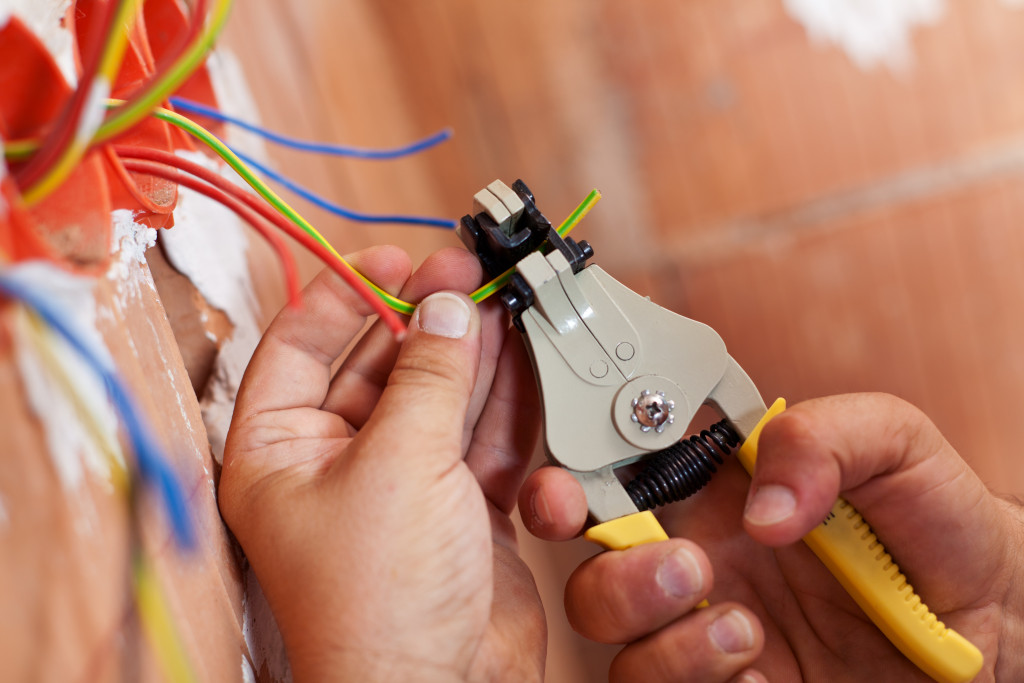- Install ground fault circuit interrupters (GFCIs) to protect against electrical shock hazards.
- Install surge protectors to limit power surges’ fire, electrocution, and equipment damage risks.
- Ensure proper electrical wiring is installed, labeled, and maintained to reduce the risk of short circuits or overloads.
- Conduct regular safety checks on outdoor lighting fixtures to ensure they are grounded and secured against wind-related damage.
Ensuring electrical safety in a commercial building is an important task that cannot be overlooked. Electrical hazards can cause severe injury or even death, so it is essential to take the necessary steps to ensure that all areas of your building are safe for employees and customers.
This article will explore some essential tips for ensuring electrical safety in your commercial building. Following these recommendations ensures that everyone in your facility stays safe while working around electricity-related equipment and appliances.
Install ground fault circuit interrupters (GFCIs)
It would be best never to compromise electrical safety in a commercial building. One of the best ways to ensure protection against electrical shock hazards is to have qualified emergency electricians install ground fault circuit interrupters (GFCIs) where necessary. GFCIs are designed to detect abnormal current fluctuations, ultimately cutting power when an overload or short circuit occurs.
This can make all the difference in preventing potentially severe shocks due to leaking currents. Skilled electricians know precisely where GFCIs should be installed – so although it may involve extra cost for hiring an experienced team – it is worth protecting your property and the people within it.
Install surge protectors
Power surges can be devastating and pose serious fire, electrocution, and equipment damage risks to those working in commercial buildings. Installing surge protectors is one of the best ways to limit these risks. Surge protectors safeguard any sensitive electronic devices such as computers, printers, and fax machines against dangerous voltage spikes in the system’s wiring which can cause sparks due to power surges.
Surge protectors help provide electrical safety by preventing card and interrupting circuit overloads. They also give you peace of mind knowing that your equipment is safeguarded against possible damages or destruction caused by voltage spikes during an electrical surge.
Regularly inspect all electrical equipment and appliances
Ensure proper electrical wiring

Ensuring the electrical wiring in your commercial building is installed correctly, labeled, and maintained is vital for electrical safety. It helps protect your employees and customers from potential hazards related to electricity by reducing the likelihood of a short circuit or overload. Properly installing the wiring gives you peace of mind that there won’t be unforeseen hazards in your building.
Additionally, labeling the wiring will help ensure only those with proper training are working on it and allow qualified personnel to identify problems quickly if they arise. And lastly, maintaining the wiring will keep it running efficiently while helping minimize long-term repairs or replacement costs. These steps to ensure electrical safety should thus be considered essential to any commercial building owner or operator.
Conduct regular safety checks
You should conduct regular safety checks on outdoor lighting fixtures in any commercial building to ensure that electrical safety is maintained. Without these checks, there is a risk of wind-related damage resulting in a short-circuit scenario. Thus, it is essential to ensure the fixtures are correctly grounded and secured against wind-related damage before they are installed.
Moreover, follow-ups may need to be performed during seasons of powerful winds or after alterations to the roofline or surrounding structures. This way, you can take the necessary steps early if something does not seem right with your fixtures, preventing potentially dangerous and costly scenarios.
Make sure all exposed wires are covered.
Although it may seem like an extra step that doesn’t matter, ensuring that all exposed wires in your commercial building are protected with sheathing is essential to ensure that your electrical system is safe. Without sheathing, live and exposed wires can easily be touched by chance when servicing other parts of the system, making it a severe hazard to anyone who does not have the necessary protection or expertise to work with electricity.
Ensuring all exposed wires are covered will help prevent accidents and keep everyone in your building out of danger. Safety should always be a significant concern when dealing with electricity so make sure to take care of this crucial safety protocol.
Use proper installation techniques.

It is essential to use proper installation techniques when connecting new wiring throughout a commercial building to ensure electrical safety. Using approved junction boxes rather than directly splicing wires will help ensure that the wiring is up to code, secure from fire hazards, and unaffected by dust or moisture.
By taking the necessary precautions with junction boxes rather than simply splicing wires together, you can avoid serious problems down the road, such as short-circuiting or even hazardous fires. Taking these steps can help put customers and employees at ease that all safety regulations are being carefully followed.
These are just a few of the many steps you can take to ensure electrical safety in your commercial building. By following these tips, you can make sure that your facility is up to code and that everyone in the building remains safe from potential shocks and fires due to faulty wiring or other electrical issues.

